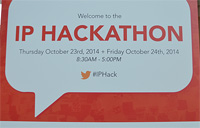
Professor Giuseppina D’Agostino, founder and director of the Intellectual Property Law & Technology Group (IP Osgoode) at Osgoode Hall Law School, stirred up the intellectual property community with her innovative approach to “tearing apart the patent system” during York University’s inaugural IP Hackathon.
IP Osgoode and collaborators and contributors from the Lassonde School of Engineering at York University, Stanford University’s d.school and the Canadian Intellectual Property Office hosted the first ever “legal hackathon” at Osgoode Hall Law School, Oct. 23 and 24. The event deconstructed the unnecessarily complex status quo patent system in an effort to make the patenting process more navigable and user friendly. Different stakeholders in the patent process, including patent examiners, patent agents, IP experts in industry, inventors, lawyers, patent agents and York U students from Osgoode Hall Law School and the Lassonde School of Engineering took part in the IP Hackathon, which was also the result of D’Agostino’s research funded by the Social Sciences and Humanities Research Council of Canada.

Osgoode Hall Law School Dean Lorne Sossin kicked off the event with a warm welcome. “Legal hackathons are rapidly evolving platforms to bring together people from multiple disciplines and thus create problem-solving tools to empower and enable its users,” he said. “This event also celebrates the novelty of our law school’s highly acclaimed scholarship. Professor D’Agostino has added a new flavour to our robust experiential learning through this event.”
Inspired by her sabbatical at Stanford University, D’Agostino highlighted the importance of legal hackathons vis-à-vis conventional academic conferences. “It is high time for the legal community to learn from outside its field and adopt a user-centric approach because its voice is critical to understand how problems are defined and resolved,” she said.
Bill Mantel, assistant deputy minister, Ministry of Research and Innovation, and the Ministry of Economic Development, Trade and Employment, was the luncheon keynote speaker and spoke of the government’s initiatives to spur innovation.
Dean Janusz Kozinski, the founding Dean of the Lassonde School of Engineering, applauded IP Osgoode’s initiative to host an IP Hackathon to bring together law and technology. “The Lassonde School is motivated to produce Renaissance Engineers through its BEST Program, which fosters innovative minds to create and commercialize technology,” said Kozinski. “IP Osgoode’s legal hackathon is a unique opportunity for students at Lassonde to work closely with their legal colleagues.”
 Along with D’Agostino, Ron Dolin, Margaret Hagan and Maya Shino, legal tech scholars from d.school and the Institute of Design at Stanford University, served as the event’s design hosts. They led the four teams of hackers through the six-stage design methodology to hack into the patent system and resolve user challenges. Making use of a design approach that was user-centric, the hackers interviewed inventors and considered their needs. User testing and continuous feedback from the inventors to the hackers formed the cornerstone of the workshop. The hackers also had the opportunity to consult with professional design developers on the usability of their prototypes and refine their prototypes. The outcome provided four sets of different user-friendly prototypes with high potential for real-life applications. In keeping with the objective of putting words into actions, each group also presented an action plan on how to advance and launch their prototype.
Along with D’Agostino, Ron Dolin, Margaret Hagan and Maya Shino, legal tech scholars from d.school and the Institute of Design at Stanford University, served as the event’s design hosts. They led the four teams of hackers through the six-stage design methodology to hack into the patent system and resolve user challenges. Making use of a design approach that was user-centric, the hackers interviewed inventors and considered their needs. User testing and continuous feedback from the inventors to the hackers formed the cornerstone of the workshop. The hackers also had the opportunity to consult with professional design developers on the usability of their prototypes and refine their prototypes. The outcome provided four sets of different user-friendly prototypes with high potential for real-life applications. In keeping with the objective of putting words into actions, each group also presented an action plan on how to advance and launch their prototype.
D’Agostino said she plans to build upon the success of the event and host subsequent IP hackathons to tackle other aspects of IP commercialization. For more information and updates, visit the IP Osgoode website or subscribe to IPIGRAM, IP Osgoode’s weekly e-newsletter.
Submitted by Meenakshi Lakhanpal and IP Osgoode


